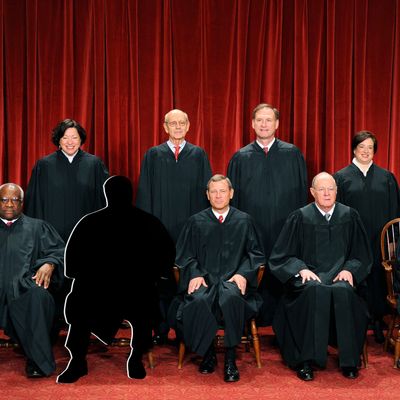
There is immense suspense as to all sorts of policy decisions of the Trump administration, and in many cases, even the timetable according to which such decisions will be made. But it looks like one key move of particular importance to Trump’s cultural conservative and corporate backers alike, his choice to replace the late Supreme Court justice Antonin Scalia, will occur next week, perhaps immediately following a meeting with GOP congressional leaders.
Politico is reporting confidently today that Trump’s once-extensive list of jurists under consideration for the Scalia seat (all pre-vetted by the conservative Heritage Foundation and Federalist Society) is now down to three names, all current Court of Appeals judges: Third Circuit judge Thomas Hardiman, Tenth Circuit judge Neil Gorsuch, and Eleventh Circuit judge William Pryor.
Other than solid conservative credentials, what the three potential justices have in common is relative youth: Pryor is 54, Hardiman is 51, and Gorsuch is a mere tot for a federal judge, at 49 (by contrast, Barack Obama’s nominee for the same position, Merrick Garland, was 63 when appointed and turned 64 while awaiting a confirmation hearing that never happened). This is very important to conservative legal activists who want to minimize exposure of the Court to nominations from future Democratic presidents.
While they are all pre-vetted by conservatives and a bit short of the age when they will begin driving with the turn signal on, the “short-short-list” candidates have some individual differences. Gorsuch has several things going for him: a much-noted similarity to Scalia in constitutional thinking and writing style, and his pedigree as the son of the late Anne Gorsuch, Ronald Reagan’s first EPA administrator. He’s also been prominent in the conservative cause of expanding “religious liberty” as grounds for noncompliance with anti-discrimination and other laws, which will please conservative Christians if he’s the choice.
Like Gorsuch, Hardiman is known as a clear writer, but as Amy Howe notes at SCOTUSblog, the Pittsburgh-based judge inspires comparisons to a different conservative justice:
Hardiman is a solid, although hardly knee-jerk, conservative who was active in Republican politics before joining the federal bench, and his jurisprudence as a Supreme Court justice likely would be closer to another justice who hails from the 3rd Circuit: Justice Samuel Alito.
Pryor has long been a lightning rod for liberal criticism thanks to his outspoken hostility to the constitutional right to choose (he once called Roe v. Wade “the worst abomination of constitutional law”). But Pryor’s involvement in a 2011 decision protecting transgender folk from workplace discrimination, and his role as Alabama attorney general in the prosecution of state Supreme Court judge Roy Moore (the “Ten Commandments Judge” who has fought a long battle against separation of church and state), have drawn some religious conservative fire. The buzz is that Pryor’s star may be fading in the SCOTUS sweepstakes, but he has a very influential ally in Senator and Attorney General–nominee Jeff Sessions, who definitely has Trump’s ear.
As should be clear from the extensive lead-in to this choice, Democrats have had zero input, and should they decide to filibuster whomever Trump goes with, there’s a good chance Mitch McConnell will pursue a rules change extending Harry Reid’s “nuking” of the filibuster for lower-court judicial appointments to SCOTUS. A big strategic question for Senate Democrats is whether they should provoke McConnell now or keep the filibuster in play in case it’s needed for another Trump SCOTUS appointment in the future, which could reshape the Court for years to come.






























